Biology:Diplopterys cabrerana
| Diplopterys cabrerana | |
|---|---|

| |
| Scientific classification | |
| Kingdom: | Plantae |
| Clade: | Tracheophytes |
| Clade: | Angiosperms |
| Clade: | Eudicots |
| Clade: | Rosids |
| Order: | Malpighiales |
| Family: | Malpighiaceae |
| Genus: | Diplopterys |
| Species: | D. cabrerana
|
| Binomial name | |
| Diplopterys cabrerana (Cuatrec.) B.Gates
| |
| Synonyms | |
| |
Diplopterys cabrerana is a shrub native to the Amazon Basin, spanning the countries of Brazil , Colombia, Ecuador and Peru.[1] In the Quechua languages it is called chaliponga or chagropanga; in parts of Ecuador it is known as chacruna—a name otherwise reserved for Psychotria viridis.[2]
D. cabrerana and P. viridis are both common admixtures for ayahuasca. Both species are rich sources of DMT, a tryptamine thought to be endogenous in humans and many other species. D. cabrerana additionally produces 5-MeO-DMT, a less common structural analog.
The plant stores the alkaloids N,N-DMT, 5-MeO-N,N-DMT, and N-methyltetrahydro-beta-carboline in its leaves and stems.[1] Leaf samples were found to be 0.17-1.75% N,N-DMT,[1] but only trace amounts of N-methyltetrahydro-beta-carboline occur in the leaves.[3] The leaves also store methyltryptamine and trace amounts of bufotenin.[1][3]
Cuttings of D. cabrerana are transplantable. The cuttings are either planted in soil directly, or rooted first in water.[1]
See also
- Psychedelic plants
References
- ↑ 1.0 1.1 1.2 1.3 1.4 1.5 Rätsch, Christian (1998). Enzyklopädie der psychoaktiven Pflanzen. Botanik, Ethnopharmakologie und Anwendungen.. AT-Verlag. p. 179. ISBN 978-3-85502-570-1.
- ↑ Goldin, Deana; Salani, Deborah (2021). "Ayahuasca What Healthcare Providers Need to Know". Journal of Addictions Nursing 32 (2): 167–173. doi:10.1097/JAN.0000000000000405. PMID 34060770. https://pubmed.ncbi.nlm.nih.gov/34060770/. Retrieved 24 November 2021.
- ↑ 3.0 3.1 www.biopark.org
External links
- The genus Diplopterys Ayahuasca: alkaloids, plants & analogs
- A General Introduction to Ayahuasca
- Diplopterys cabrerana fruit
- [1] and [2], herbarium specimens with fruits
- University of Michigan Herbarium - Diplopterys cabrerana June 2014
Wikidata ☰ Q1939784 entry
 |

